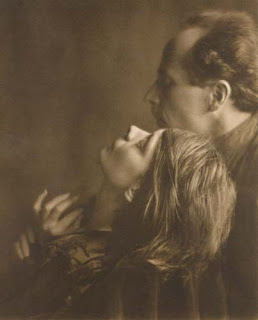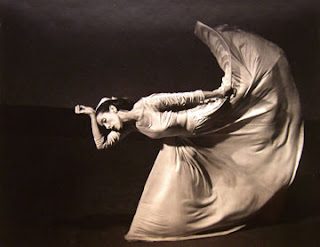My experience of female photographers on the internet on sites like Flickr, is that they can be the most inspiring, creative and exciting exponents of the craft of photography seen today, but they can also be the most predictable, boring and self indulgent of all photographers. Self portrait after self portrait, flower after flower, shoes after shoes, pet after pet, baby after baby. That said, it was seeing the work of a female photographer (Diane Arbus) that slapped me across the face and woke me up to the power of photography again.
To get to the point of this post - can (and should) forms of expression be discussed in 'men's' or 'women's' art? Does gender affect output? (Not many female landscape photographers is there?) Does gender of the photographer affect the viewer's response to the image?
Well, having listened to Jeff Curto's Class # 11, Spring 2011 podcast, the answer seems to be, no. Time and place determine style, not gender. The so called golden era of photography (1880-1920s) coincided of course with social, cultural and political change, especially for women. Historically, photography has been a male dominated field, due partly to the technical and scientific nature of the art form, but also due to the fact that men were involved in photography as a commercial, money making venture. Women's place remained in the home, as wife and mother, until quite recent times. Women were often stuck at home and not until there was a series of technological advances which could 'release' them from the home, could they grab the new Kodak and shoot the flowers, pets, babies and friends that surrounded their world, i.e not too far from the hearth. Working class women of course remained in a life of poverty and toil, in the factory or working in the 'big house'. Interestingly, many started late in life to help deal with 'empty nest syndrome'. Women moved from the hearth to groups like the photo secessionists, FSA and f64. They were soon making social and political comment and embracing all technical aspects of their craft.
As their world changed and more opportunities opened up for women photographers, they have produced some of the most creative, original and powerful pieces of work. They have moved far from the hearth and are often at the forefront of photography. A great excuse to show some examples of the development of women photographers (mostly American):
Julia Margaret Cameron:
Lady Clementina Hawarden:
Frances Benjamin Johnston
Gertrude Kasebier
Anne Brigman
Chansonetta Stanley Emmons
Imogen Cunningham
Dorothea Lange
Marion Post-Wolcott
Margaret Bourke-White
Barbara Morgan
Diane Arbus
Marie Cosindas
Olivia Parker
Joyce Tenneson
Sally Mann
Annie Leibovitz
Connie Imboden
Cindy Sherman
Mary Ellen Mark
Susan kae Grant
Thanks again to Jeff Curto's History of Photography.





















4 comments:
As a female photographer that is mostly stuck at home these days, I find it very difficult to find inspiration for taking 'interesting' photos.
I find it interesting how quickly the desire to adequately stage photos (whether in the grander sense of that word or just in the sense of moving clutter to improve composition) can leave when the places to stage them are confined to four rooms.
Hi Jyll,
Thanks for the comment. Recent documentaries have taught me a few things. William Eggleston moved to an area he thought was ugly so he just shot the mundane and the ugly but, through vivid colour made them interesting; Cindy Sherman did many of her self portraits in a room where she set up a small studio and got to work on her appearance with masks and make up; Sally Mann realised she had the best models in her own family and, using old equipment, photographed them at home.
So it seems it is the 'added ingredient' that can make all the difference.
James
An interesting blog post, James, and you've highlighted many women photographers that I'd never heard of before.
The little girl in Gertrude Kasebier's photo looks just like my niece a few years ago!
Cheers TIm,
Hope you can find some time to read through some of the other posts.
James
Post a Comment